| By: Paul S. Cilwa | Viewed: 4/23/2024 Posted: 12/4/2006 Updated: 3/5/2022 |
Page Views: 5382 | |
| Topics: #Music | |||
| I reminisce about some of my favorite 78 rpm records. | |||
Previous posts have described how mechanical recordings were made and played, and how I myself owned a hand-cranked Victrola when I was a kid in Vermont. In today's post I'd like to reminisce about some of my favorite 78 rpm records.
Prior to moving to Vermont, my Dad, a true music lover, had always made sure I had a working phonograph and a supply of records to play on it. One time, exploring the house in that way only a six-year-old can do, I discovered a stash of 78s in his bottom dresser drawer. I was very excited, but he told me he intended to dole them out a few at a time, to make sure I wasn't overwhelmed with too many new songs at once. To ease my disappointment, he gave me the album at the top: Act 1 of Verde's Aida.
Was opera too heavy for a six year old? No one had told me it should be, and I played all ten 16-inch disks, one after the other. Some of the slower arias I found boring; and, of course, I couldn't understand any of the words, which were in Italian. But I didn't care. All the labels to the songs were also in Italian, but I memorized my favorite pieces by the pattern of the words and also the pattern of the grooves on the record side. My very favorite? As it turns out, it's the same as everyone's: The Grand March.
The Grand March from Aida
By Giuseppe Verdi
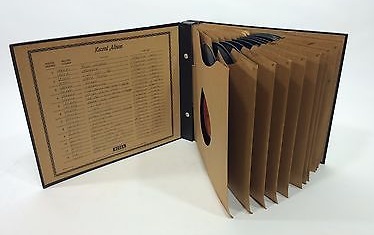
Large-scale pieces, such as operas and symphonies, were in those days released as true albums, that is, analogous to photo albums in that they consisted of a number of "pages" (called sleeves) bound together between a sturdy cover. Each sleeve held one disk; typical albums consisted of from three to ten disks. Classical music was usually recorded onto 12-inch disks; popular tunes were usually on 10" disks. Children's songs were sometimes on 7-inch disks. The smaller the disk, the shorter the available playing time, of course.
Other classical pieces I had included Wagner's Ride of The Valkyries (which I loved) and Tchaikovsky's Nutcracker Suite, which I didn't know was associated with Christmas and so played all the time. I remember when I was kept home from school with the chicken pox, for some reason Nutcracker's "Arabian Dance" was soothing to me, and I played it over and over.
Another favorite was the Golden Records' recording of Little Toot, about a mischievous tugboat who "came from a line of tugboats fine and brave" but nevertheless didn't "give a hoot." I cherished that record and was happy when I played it (now in MP3 format) to my then-three-year-old grandson, Zachary. It likewise became his favorite song, until it was eventually replaced by the works of 50 Cent.
Little Toot
By Allie Wrubel
Performed by David Richards, 1949
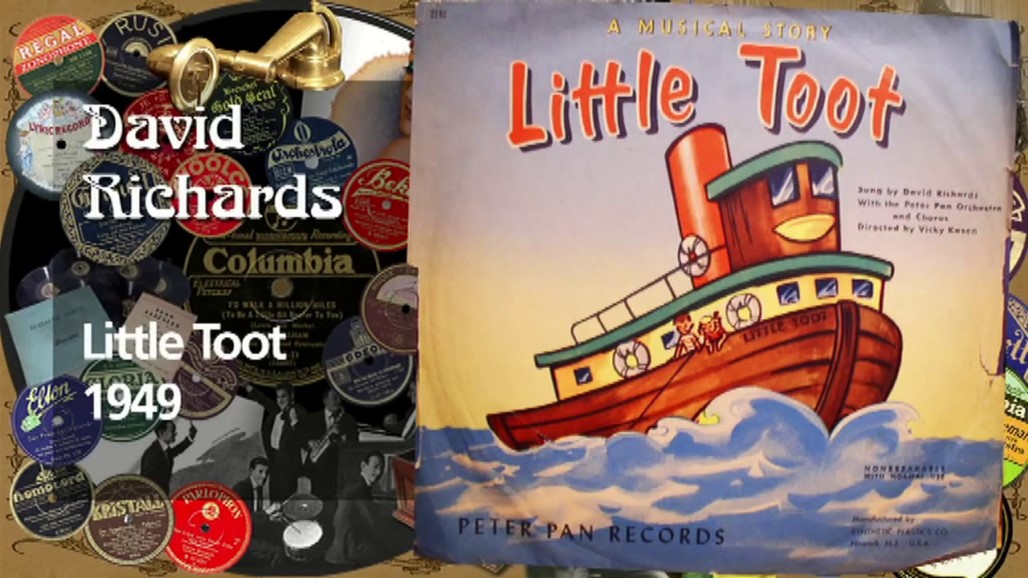
Lyrics
Little Toot was just a tug
Just a happy harbor tug
And he came from a line of tugboats fine and brave
But it seems that Little Toot
He simply didn't give a hoot
Though he tried to be good, he just could not behave.
He's cute as a bug, that chubby little tug
Called Little Toot.
(Toot, toot, toot.)
He got the goat of every boat afloat
With his
little toot.
(Toot, toot, toot.)
He liked to play out in the bay;
He thought work was a joke.
And he
annoyed the freighters with his figure-eighters
And his big, black puff
of smoke.
They called him a kid. The other tugboats didn't
Give a hoot for
Little Toot.
He got so mad, felt so very bad, he
Snuffed his snoot.
Said, "Oh, shoot!"
A ship in distress came into view.
All by himself, he made the rescue!
Now, the other tugboats stand around and root,
They root for Little Toot!
So chug-chug-chug, heave ho! My lad,
And be a Big Toot just like your
dad.
Chug-chug-chug, full steam ahead,
Puff with every breath.
He's cute as a bug, that chubby little tug
Called Little Toot.
(Toot, toot, toot.)
He got the goat of every boat afloat
With his
little toot.
(Toot, toot, toot.)
He liked to play out in the bay;
He thought work was a joke.
And he
annoyed the freighters with his figure-eighters
And his big, black puff
of smoke.
They called him a kid. The other tugboats didn't
Give a hoot for
Little Toot.
He got so mad, felt so very bad, he
Snuffed his snoot.
Said, "Oh, shoot!"
A ship in distress came into view.
All by himself, he made the rescue!
Now, the other tugboats stand around and root,
They root for Little Toot!
In addition to providing recordings for youngsters, Golden Records sold "covers" of hit songs. These were sound-alike copies of top ten tunes, sung by someone other than the original artist and costing a fraction of the cost of the actual hit (not that any records were very expensive in those days). Therefore, I had Golden Records rip-offs of The Banana Boat Song, Green Door, and Blueberry Hill. That latter was my Dad's favorite song, and when we discovered blueberries growing all over the property in Vermont, he promptly named the place "Blueberry Hill."
There was also a record, whose title and artist I have forgotten, but that nevertheless sticks in my mind. The singer was a little boy with an unusually sophisticated voice, who was apparently being marketed as a new, male, Shirley Temple; both songs on the disk were tear-jerkers, one in which the boy prays to God to revive his dead puppy, the other in which he urges his parents not to break up. Of course, at six I didn't really know what he was singing about; but I found his voice to be a little creepy.
I had a few other contemporary records—Kay Starr's Rock and Roll Waltz and The Chipmunk Song—but most of my record collection consisted of 78s from the '40s:
- The Old Lamplighter
- Don't Sit Under The Apple Tree (With Anyone Else But Me)
- Stalin Wasn't Stallin'
- The Darktown Strutters' Ball
As you can see, no effort was ever made to limit the music to which I was exposed. Black and white recording artists were both represented (not that I could tell the difference) and Second World War tunes shared space with pieces that would now be considered to be politically incorrect. (In fact, I found out there had been a Second World War in response to questions I asked about Don't Sit Under The Apple Tree.)
With repeated playings, I quickly memorized the words—or sound-alike words, if I didn't understand the real ones. I loved to sing along, and did so at the top of my lungs, usually with my bedroom door shut. (My Mom must have found it comforting to know what I was doing wherever she was in the house. When I got quiet, she got nervous.) The lyrics to Stalin Wasn't Stallin' gave you just about everything you wanted to know about the Russian defeat of the Nazis:
Stalin Wasn't Stallin'
By Willie Johnson
Performed by the Golden Gate Quartet, 1943
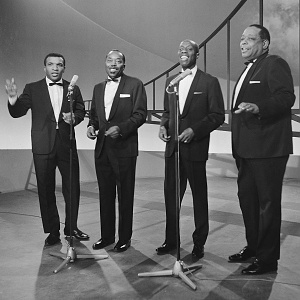
Lyrics
Stalin wasn't stallin'
When he to1d the Beast of Berlin
That they'd never rest contented
Till they had driven him from the land
So he called the Yanks and English
And proceeded to extinguish
The Fuhrer and his vermin
This is how it all began.
Now the Devil he was reading
In the Good Book one day
How the Lord created Adam
To walk the righteous way.
And it made the Devil jealous
He turned green up to his horns
And he swore by things unholy
That he'd make one of his own.
So he packed two suitcases
Full of grief and misery
And he caught the midnight special
Going down to Germany.
Then he mixed his lies and hatred
With fire and brimstone
Then the devil sat upon it
That's how Adolf was born.
Now Adolf got the notion
That he was the master race
And he swore he'd bring new order
And put mankind in its place!
So he set his scheme in motion
And he was winning everywhere
Until he up and got the notion
For to kick that Russian bear.
Yes he kicked that noble Russian
But it wasn't very long
Before Adolf got suspicious
The he had done something wrong
Cause that bear grabbed the Fuhrer
And gave him an awful fright
Seventeen months he scrapped the Fuhrer
Tooth and claw, day and night.
Then that bear smacked the Fuhrer
With a mighty armored paw
And Adolf broke all records
Running backward towards Krakow.
Then Goebbels sent a message
To the people everywhere
That if they couldn't hit the Fuhrer, Lord,
Don't hit that Russian bear!
The song had been recorded by the Golden Gate Quartet in 1943. By 1963, when I was old enough to understand that the Cold War meant we were supposed to hate the Russians, I couldn't help but note that just two decades earlier, the Russians had been on our side and celebrated as heroes in popular music.
Another bit of trivia I picked up from that record was the fact that it was produced by Okeh Records. I had picked up my first information regarding record publishing and the companies that do it from my Dad, by asking about record labels. I recognized RCA Victor and Columbia and Decca and Mercury, and had even learned that the " Bluebird" label was a subsidiary of RCA and what that meant. Okeh was a new one on me, so Dad had to explain that they were a special label for black performers. The information was presented neutrally. I already knew that Victor Red Seal was a special label for classical music; so the idea of special labels for various classifications didn't seem that unreasonable to me. If he'd told me there was a special label for blondes or for songs whose titles began with the letter 'S' I wouldn't have had any more trouble accepting it.
When we moved to Vermont in 1958, knowing there would be no electricity at our new township, Dad bought me a beautiful upright, hand-cranked Victrola—and, best of all, a whole ice chest full of records to play on it! (You can see the ice chest in the photo, at the lower right.) He haunted second-hand stores and auctions, and probably had purchased the two items together. Not that used 78s were hard to get in those days, but in this case the treasure turned out to be the range of music in that chest; for the disks went all the way back to the second decade of the century, as old as a record could be and still be a disk (rather than a cylinder).
I spent many, many hours in that attic with my Victrola, sometimes reading while a record played; more often singing along with it, even though I had no idea what most of the songs actually meant.
One of them was Hello, Aloha, How Are You? (with "How Are You" pronounced more like "Ha-wye-ya"). As with most of these songs, I was disinterested in the name of the singer and have had to look them up since. But I knew the title and the lyrics—I still remember the lyrics to all my favorite songs!—and I will never forget the unusual look of that disk, which was pressed on brown shellac. The lyrics, sung quite fast, were a real challenge to master:
Hello, Aloha, How Are You?
By Wolf Gilbert and Abel Baer
Performed by Ronnie Munro and His Orchestra, 1926
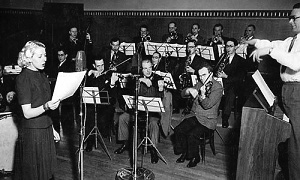
Lyrics
Hello, aloha, how are you?
I'm bringing you kisses
From over the sea.
Hello, aloha, how are you?
I'm happy to find you
Still waiting for me
Now I can uke a uke
And you can uke
And we can uke a ukulele too
As I can wick
And you can wack
And we can wicki wicki wacki woo!
So hello, aloha, how are you?
I'm bringing you kisses
From Hawaii and me
The challenge to me was that I had no idea what a ukulele was, or Hawaii either—this was before it became a state. So Mom had to explain both to me; and thus the next year, when Hawaii did become a state, I was the only kid in my class who had heard of it, as well as being able to locate it on a map.
A less obscure favorite is the brilliant 1919 tune, Don't Take Advantage Of My Good Nature. One of a number of songs that celebrated that new invention, the automobile, Don't Take Advantage humorously examined the impact cars had on the dating rituals of the day:
Don't Take Advantage of My Good Nature
Words by Howard E. Rogers; Music by James V. Monaco
Performed by Fred Whitehouse, 1920
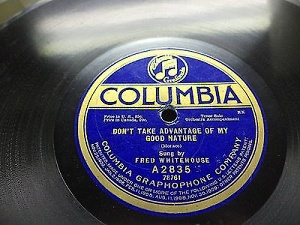
Lyrics
Daisy was just crazy
'Bout automobiles
She'd miss all her meals
To ride in a car.
The boys would take her riding and then
They'd bring her home, but never again!
Whenever she'd go out
In someone's runabout,
She'd always say "No listen, Dear,"
You can hold my hand;
Yes, and understand,
You can drive me anywhere, And I won't care.
I'll sit close to you,
Let you squeeze me, too,
Because I'm always willing For anything that's thrilling!
You can steal a kiss;
One I'll never miss.
I may even give you two or three or four!
But don't take advantage
Of my good nature, 'Cause
I've got out and walked before!
The Tennessee Waltz
Patti Page recorded and released this beautiful song about a woman who loses her to love to a friend on the dance floor, in 1950. It was her biggest hit. She re-recorded the piece a half-dozen times in stereo and with an "updated" arrangement, but the first is still the best.
The Tennessee Waltz
Lyrics by Redd Stewart and music by Pee Wee King
Performed by Patti Page, 1950
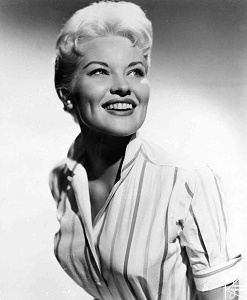
Lyrics
I was dancing with my darling to the Tennessee Waltz
When an old friend I happened to see
I introduced her to my loved one
And while they were dancing
My friend stole my sweetheart from me
I remember the night and the Tennessee Waltz
Now I know just how much I have lost
Yes, I lost my little darling the night they were playing
The beautiful Tennessee Waltz
I was dancing with my darling to the Tennessee Waltz
When an old friend I happened to see
I introduced her to my loved one
And while they were dancing
My friend stole my sweetheart from me
I remember the night and the Tennessee Waltz
Now I know just how much I have lost
Yes, I lost my little darling the night they were playing
The beautiful Tennessee Waltz
By the way, Patti Page was the very first artist to use the recording technique called "overdubbing," in which the same singer records multiple parts which are played back together, making the singer sound like a duet (Page's song Confess) or even a quartet (With My Eyes Wide Open, I'm Dreaming). This technique was probably brought to its highest level by Enya (99 voices), and today is quite common—I've used it myself.
Watermelon Weather
This ultra-smooth duet between Perry Como and Eddie Fischer, a light-hearted paean to summer, was my introduction to the vocal style known as "crooning."
Although this duet was hardly Como's first hit, or biggest, it was my introduction to the singer. Later, while spending the winter in Val's Motel in Concord, I heard Catch A Falling Star on the jukebox and was hooked. While Como was easy to satirize—I have a friend who calls him "Perry Coma"—the fact is that Como was able to make the extremely difficult task of interpreting a song so that the song, and not the performer, is the star—seem so easy that he barely even seemed to be present. His lack of ego was evident in his personal life, as well. (He was married to one woman, a girl he'd met when he was 16, until her death when he was 84.) Lack of ego is a lesson I need to work on; but at least Como is an example I can try to follow.
Watermelon Weather
By Hoagy Carmichael and Paul Francis Webster
Performed by Perry Como and Eddie Fisher, 1952
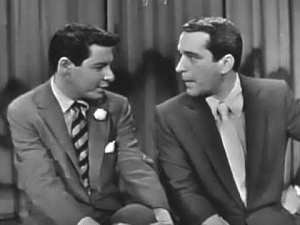
Lyrics
It's watermelon weather
That summer kind of weather
When people get together and sing
It's the time of year
The stars seem to dance with laughter
And the moon's so big and ripe
It can hardly climb
So, why don't you meander
To your best gal's veranda
And sorta, kinda, hand her the ring?
For it's the sweetheart kissin' season
And all the world's in rhyme
When it's watermelon sweet love tellin' time
This is the time to sing this kind of purdy little ditty
A walkin' along an' singin' a song and clinging to someone purdy
The type of a tune to go with the moon
That's sailin' along a way on high
After strollin' a while, for maybe a mile
Remember to stop and pop the question
If your timin' is right, your future is bright
As bright as a watermelon sky
And then when you found a bench for two
You found your cue to linger
The chance you sought to show what you bought
You happily thought to bring her
To cinch the thing, you give her the ring
You purchased from the five and dime
Take her in your arms and whisper
That you are mine all mine
And with that line to sell, I'm here to tell
That you'll do well in watermelon time
For it's the sweetheart kissin' season
And all the world's in rhyme
When it's watermelon sweet love tellin' time
Though Como's and Fisher's vocal styles (crooning) are so similar they sound like brothers (or even the same singer overdubbed) when harmonizing, their personal lives couldn't be more different. While Como was married just once, Fisher was married five times, each to one of the world's most beautiful women: Debbie Reynolds (married 1955-divorced 1959), Elizabeth Taylor (married 1959-divorced 1964), Connie Stevens (married 1967-divorced 1969), Terry Richard (married 1975- divorced 1976) and Betty Lin (married 1993). Betty Lin died on April 15, 2001. Fisher is the father of two children by Reynolds, actress Carrie Fisher and Todd Fisher, and the father of two children by Stevens, actress Joely Fisher and actress Tricia Leigh Fisher. Fisher's two autobiographies barely mention his singing career; one wonders that he had any energy left to sing at all!
Because Of You
Tony Bennett is still singing at the age of 80, and Because of You was his first hit. Singing along with this record taught me by example the technique of singing out, with nothing held back. (In his concerts, he still demonstrates that it's possible to sing a song without any microphone, yet be heard above the sound of the band.)
Because of You
By Arthur Hammerstein and Dudley Wilkinson
Performed by Tony Bennett, 1951
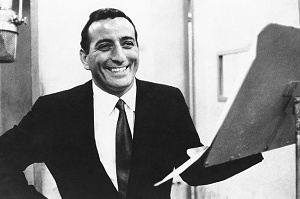
Lyrics
Because of you there's a song in my heart
Because of you my romance had its start
Because of you the sun will shine
The moon and stars will say you're mine
Forever and never to part
I only live for your love and your kiss
It's paradise to be near you like this
Because of you my life is now worth while
And I can smile
Because of you
[Instrumental Interlude]
I only live for your love and your kiss
It's paradise to be near you like this
Because of you my life is now worth while
And I can smile
Because of you
Although it was 1958 when I got this record, it was released in 1951. A subsequent hit for Bennett was Stranger in Paradise, which I had heard and fallen in love with on a jukebox at a bowling alley my parents frequented. It was my favorite song there, and was the first cover song I envisioned when planning my own album.
Incidentally, Tony Bennett was one of the first celebrities to work for an end to racial discrimination. In fact, he began resisting this while he was still in the Army at the close of World War II. That alone would make him one of my heroes.
I guess my point is how potent can be the music one listens to when growing up. Folks generally think the music of one's teenage years is what stays with a person, but I think I present an example of how important the music one hears at the earliest years—and especially 7, 8 and 9 years old—is equally if not more important in shaping the character and musical tastes of a lifetime.
Maybe I'd better start guiding my grandson Zachary away from 50 Cent.





